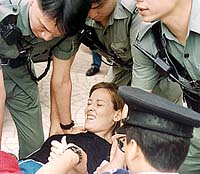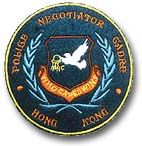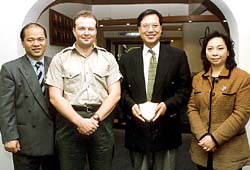



















| |
 Police restrain a woman after she attempted to jump off the Star Ferry Terminal into Victoria Harbour in a suicide attempt. Members of the Police Negotiator Cadre must be prepared to deal with cases like this on an ongoing basis |
For members of the Police Negotiator Cadre, emergency calls can come at any time and from
any place. The only thing for certain is that the way in which they manage a crisis situation can
mean the difference between life or death . . .
CHIEF Inspector Mak Chui-tong will never forget the early hours of the second day of Lunar New Year 1989. It was a cold and rainy morning and he was called out of his warm bed to attend to an 18-year-old girl who threatened to kill herself over an affair of the heart with her boyfriend. When CIP Mak arrived on the scene, the girl was sitting on the rooftop of a building in Yau Ma Tei from which she intended to jump. After talking with the women for two hours, CIP Mak convinced her to come down from the rooftop. "That was another sleepless night," he recalled. |
|
Superintendent Cheng See-hing, another volunteer member of the Police Negotiator Cadre, recalls the time he was summoned to a construction site where a distressed and suicidal woman had climbed high into the scaffolding surrounding a building with the intention of jumping to his death. SP Cheng talked to her for more than ten hours before she was convinced to come down. After the incident, both the woman and members of her family got down on their knees to express their gratitude to SP Cheng. It was a moment for the police superintendent will never forget. "I'll never forget the itching, either," recalled SP Cheng. "After half a day of tense negotiation on that damp scaffolding, and I was almost bitten to death by mosquitoes and other insects. I itched for almost three months." Police Negotiator Cadre member WIP Amy Cheng Yi-mui was having a romantic Valentine's Day dinner with her husband two years ago, when she received a call that a suicidal woman had locked herself in her flat and was going to kill herself because of a failed marriage and business. WIP Cheng left immediately. But when she arrived at the scene, firemen had already broken into the woman's flat, where they found her sitting alone, talking on the telephone. "She looked perfectly okay - at least physically," recalled the woman inspector. "But by the time I got back to dinner with my husband, the festive mood of the day had been spoiled. Being a police negotiator can take its toll on family life." | |
|
These examples illustrate the everyday challenges faced by members of the Police Negotiator Cadre (PNC) who are expected to respond promptly to call-outs and to work unsociable hours while at the same time balancing their normal police duties and the needs of their family members. When asked why they would take up such an additional and formidable task, the response is immediate and shared by all - police negotiators instantly feel that they have provided a service to the community, and even more, have saved a life. The sense of satisfaction after handling a case successfully is beyond description. |

|
|
The opposite, however, is true for cases that end in tragedy. Acting Chief Inspector Wu Chun-shing recalled his first call-out as a police negotiator in 1990 when a man threatening suicide jumped to his death from the top of a building in Western just minutes after he arrived on the scene. Acting CIP Wu was subsequently haunted by feelings of guilt and felt under great pressure for quite a while after the incident. "I gradually regained my confidence in ensuing cases of attempted suicide where I managed to talk the subjects out of taking their own lives," said Mr Wu. "But the first death I can never forget." The Police Negotiator Cadre (PNC) is a volunteer unit set up in 1975 to provide the Hong Kong Police Force with a negotiator capability that can be called upon by incident commanders during crisis situations such as would-be suicides, a hostage-taking or barricaded sieges. It was formed in response to its perceived need after a 1974 armed bank robbery in Mong Kok where a man held a group of customers hostage inside the bank overnight. At that time, there were no trained negotiators in the Force to mediate a positive outcome to the situation. The PNC was also formed in light of an increase in world-wide terrorist activities and other crisis situations which occurred in the mid-'70s such as airline hijackings and hostage-taking. In 1986, ten years after the PNC was formed, the cadre was expanded and split into regional teams to respond to incidents of domestic violence. Today there are 49 cadre members (experienced officers ranging in rank from station sergeant to senior superintendent), comprising 39 men and 10 women officers. Police officers wishing to join the PNC are required to sit for psychological aptitude tests before being accepted to a five-day negotiator induction course. The purpose of such screening is to ascertain an officer's capability to stand pressure and how flexible he or she is - two key essentials for crisis negotiation. Because when the police negotiator arrives on the scene and starts to deal with the subject, it becomes his or her sole responsibility to resolve the problem. And as it is a matter of life-and-death, the negotiator's every decision is equally important and connected. This so-called "spotlight effect" can put tremendous pressure on cadre members who must nonetheless remain totally focused from the planning stage of negotiation to its completion. Moreover, a dialogue can last for hours (and even days) with neither party actually knowing what will happen from one minute to the next. What the police negotiator says and what is done very much depends on the subject's behaviour, so being astutely flexible is paramount. In addition, a cadre member must be a good listener and continuously develop these and other skills of perception. In a crisis situation the subject will undoubtedly be in a highly emotional state of distress, confusion or maliciousness. The negotiator's willingness to listen is the first step in breaking the ice, starting a dialogue and building up a bond of trust that is fundamental to the techniques of persuasion that follow. Cadre members are trained not to tell lies nor to satisfy the needs of the subject without knowing his/her ulterior motives. | |
|
After successfully passing the aptitude tests and completing the five-day negotiator induction course, officers are then attached to the Regional Negotiator Teams where they will continue to receive on-the-job training and guidance. At the initial stage, new members are only allowed to observe real crisis negotiations and must be accompanied by an experienced cadre member on every call-out until they are deemed skilful and capable enough to work independently. A two-week advanced course is provided for veteran cadre members who are on call to respond to contingency plans involving counter-terrorism, and who are continuously updated by personnel from the Technical Services Division and Telecommunications Branch on knowledge of communication and video equipment in preparation for any real or perceived terrorist incidents. Moreover, every year one or two of the veteran cadre members are nominated to attend overseas training courses given by such law enforcement organisations as the FBI and London's Metropolitan Police Force. |
 The Police Negotiating Cadre recently held a "handing over" ceremony at the PTS Officers' Mess where the unit's former officer-in-charge, Acting ACP Charles Wong Doon-yee, praised members' dedication and enthusiasm which has contributed greatly to the cadre's success and thanked them for sacrificing their leisure time to take up this extremely worthwhile challenge. His successor, SSP Peter Morgan, said he would try his best to maintain and further the cadre's record of success and looked forward to its members' continuing support |

![]()
